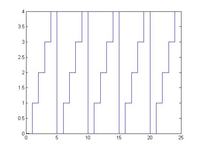thaitam
Junior Member level 2
Hi
I have a set of discrete values say 10 however I wish to make this 100 values as the ten values all step to each other.
Using the stairs(x,y) command I can visualise however I need to expand the y values to 100 so that I can subtract the stair wave from a sine wave which has 100 elements.
Regards
thaitam
I have a set of discrete values say 10 however I wish to make this 100 values as the ten values all step to each other.
Using the stairs(x,y) command I can visualise however I need to expand the y values to 100 so that I can subtract the stair wave from a sine wave which has 100 elements.
Regards
thaitam
